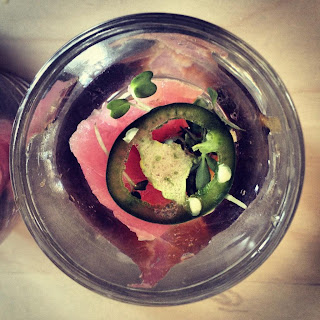Preserved Lemons - Cathy
So, I'm getting a bit of grief for not utilizing my Christmas present enough (Hey, I've done one posting so far...), and all of my kids are getting way ahead of me in entering Walsh Cookbook recipes and also some great ones of their own. Caity is home for a visit, so while she's here I'm taking advantage of her help with photography, cooking and website skills to help me out with a few entries (besides the fact she's shaming me into getting around to it).
This is an easy, faster version of a traditional Moroccan condiment that normally takes a month or so to make. I started making these many years ago and over the years have adapted concepts from several different sources for this method. I always have some stashed in the fridge with more in the freezer as a backup supply. It's also a great present for a friend to brighten up a gloomy winter day, or to freshen up a hot, dry summer stretch.
Preserved lemons are a fabulous bright, salty tidbit to add to anything you feel needs a little punch to it's flavor; a little surprise bite of lemony-ness for many things, including of course Moroccan and other Middle Eastern foods.
The well-rinsed and chopped bits are wonderful served as a garnish with vegetables (roasted red pepper strips with some chopped parsley, chopped lemon bits and a drizzle of good olive oil--yum), fish, or chicken; in sauces, dips, salads--particularly grain-based salads like Israeli couscous and tabbouleh, or Nicoise-type salads.
It's to die for in a tuna salad sandwich, and wonderful in couscous or rice. It keeps for a very long time in the fridge, but I tend to make a large batch, then keep most of it in quart-sized freezer ziplocs in the freezer, with just some in this pretty jar in the fridge.
6 or so organic lemons (you'll be eating the peel, so organic is best)
Kosher salt (or sea salt), lots (maybe 1/4-1/2 cup?)
Set aside one lemon to use for juice. Scrub the lemons very well, then slice very thinly--into sixteenths or even smaller if lemons are large. The thinness is what helps the process to move along much faster than traditional methods that leave the fruit almost whole. It also makes for quicker chopping when you want to use them.
Put into a large bowl, then put astonishing amounts of salt over the slices, mixing and turning. I don't know how much exactly, but the slices should all be quite well-coated in it. Squeeze the extra lemon over all, then stir it all around some more to make sure the salt is well-distributed. Spoon into 2 or 3 quart-sized ziplocs, squeezing out the extra air.
Leave them to sit on your kitchen counter for usually 3-7 days, turning and smooshing around every now and then to make sure that the slices are all well-covered in juice.
You'll know it's ready when the rinds start to look translucent, but the real test is to rinse off a slice very well, then taste it to make sure there is no trace of bitterness left. Freeze what you won't use soon right in the ziploc bags; it will keep pretty much forever in the freezer.
Pack some into a jar to keep in the fridge, along with its juice (great for when you need some highly salty lemon juice to add to salad dressing, etc.). It will keep for months, but if it starts to get too soggy or smell just a bit odd instead of fabulously bright and lemony, then it's time to discard and get more from your freezer stash.
Always rinse very well before using. Most recipes say to discard the pulp and membranes, using only the rind, but sometimes I use all of it--it's up to you. Once you get in the habit of using preserved lemons, you'll have a hard time living without them, and you'll be finding all kinds of things to add them into.
If you have any new ideas let me know! (And I'm one of the few humans left not on Facebook so you'll have to leave your comments here!)







Comments
Post a Comment